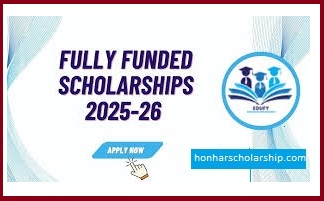
The Fulbright Program is one of the most prestigious and well-known international exchange programs in the world. Established in 1946 by Senator J. William Fulbright, the program aims to increase mutual understanding between the people of the United States and other nations through educational exchange. The Fulbright Scholarship is a powerful platform for students, scholars, and professionals to engage in research, study, or teaching in the United States or abroad. With the announcement of the Fulbright Scholarship 2025-26 cycle, prospective applicants are gearing up for one of the most transformative opportunities of their careers.
In this article, we will explore the Fulbright Scholarship’s significance, eligibility criteria, application process, and how it can enhance personal and professional growth.
What is the Fulbright Program?
The Fulbright Program provides funding for individuals to study, teach, or conduct research abroad. The goal is to foster international cooperation and cultural exchange through educational initiatives. The program supports diverse disciplines, including the humanities, social sciences, natural sciences, and the arts.
Fulbright scholarships are awarded to students, scholars, and professionals across various countries, facilitating cross-cultural exchange that contributes to addressing global challenges. Over the years, the Fulbright Program has become synonymous with academic excellence and diplomacy, with over 390,000 alumni spanning across 160 countries.
The Fulbright U.S. Student Program provides American students with the chance to study or conduct research in a foreign country, while the Fulbright Foreign Student Program offers similar opportunities for students from abroad to come to the United States. The 2025-26 cycle is expected to continue to build on this legacy.
Key Features of the Fulbright Scholarship
The Fulbright Scholarship offers unique features that set it apart from other academic programs:
- Cultural Exchange: Participants get the opportunity to live and work in another country, sharing their own culture while learning about the host nation’s values, traditions, and educational system.
- Academic Collaboration: Scholars, students, and professionals work with prestigious universities, research centers, and other institutions, contributing to innovative projects and groundbreaking research.
- Financial Support: The Fulbright Scholarship covers expenses such as tuition, airfare, living stipends, and health insurance for the duration of the program. Specific benefits may vary depending on the country and program type.
- Global Network: Fulbright alumni become part of a global network of professionals committed to international collaboration, cultural exchange, and tackling pressing global issues.
Eligibility Criteria
The eligibility criteria for the Fulbright Scholarship vary slightly depending on the applicant’s background and the specific program they are applying for. However, the following general criteria apply:
- Citizenship: U.S. citizens are eligible for the Fulbright U.S. Student Program, while non-U.S. citizens can apply for the Fulbright Foreign Student Program to study in the United States.
- Academic Qualifications:
- U.S. applicants should have a bachelor’s degree or its equivalent by the time they begin the program. For non-U.S. applicants, the academic requirements vary by country, but generally, applicants need to have completed their undergraduate degree or be in the final stages of their studies.
- Applicants should have a strong academic record and demonstrate the potential to contribute to the field of study or research.
- Language Proficiency: Depending on the program and destination country, proficiency in the host country’s language may be required. Applicants are typically assessed based on their language skills in interviews or via standardized language tests.
- Commitment to Public Service: Fulbright applicants are often selected based on their commitment to serving the public, their interest in fostering mutual understanding, and their ability to contribute to solving global challenges.
- Field of Study: Fulbright scholarships are available across many disciplines, including education, the arts, business, law, science, and technology. Applicants must demonstrate how their academic interests align with the goals of the Fulbright Program.
- Professional Experience: Some applicants, especially those applying for Fulbright Scholar Programs, may need to demonstrate relevant work experience in their field. However, students and recent graduates are also eligible to apply.
The Application Process
The application process for the Fulbright Scholarship is comprehensive and requires careful preparation. Here is a step-by-step breakdown of the process for the 2025-26 cycle:
- Start Early: The application process typically begins one year prior to the program start date. For the 2025-26 Fulbright Scholarship, the application deadline for U.S. applicants is expected to be in the fall of 2024.
- Research and Choose the Right Program: The Fulbright Program offers various types of opportunities, including research, study, and teaching. Applicants should thoroughly research the programs available in their desired destination country and choose one that aligns with their academic and professional interests.
- Prepare Application Materials:
- Personal Statement: Applicants need to write a compelling personal statement that outlines their academic background, career goals, and reasons for applying to the Fulbright Program.
- Project Proposal: For research or study programs, applicants must submit a detailed proposal outlining their intended research, objectives, and how their project will contribute to the field.
- Letters of Recommendation: Three strong letters of recommendation are required, typically from professors, academic advisors, or professional mentors who can speak to the applicant’s qualifications and potential.
- Submit Application: Applications are submitted online through the Fulbright Program’s website. It is essential to follow the application guidelines carefully and ensure that all materials are submitted before the deadline.
- Interviews: After reviewing applications, shortlisted candidates will be invited for interviews. Interviews are a critical part of the selection process and provide an opportunity for applicants to further demonstrate their qualifications and suitability for the program.
- Final Selection: After interviews, candidates will be notified whether they have been selected for the Fulbright Scholarship. Finalists will receive information on the next steps, including visa arrangements and program orientation.
Benefits of the Fulbright Scholarship
The Fulbright Scholarship is a transformative opportunity that offers numerous personal, academic, and professional benefits:
- Academic and Professional Growth: Fulbright recipients gain access to top-tier academic resources, networks, and research opportunities that enhance their intellectual development and career prospects.
- Cultural Immersion: Living and working in a foreign country enables Fulbright scholars to gain a deeper understanding of different cultures, languages, and global issues. This cultural immersion fosters open-mindedness and global citizenship.
- Networking: The Fulbright community consists of scholars, alumni, and professionals who continue to collaborate long after the program ends. As a Fulbright Scholar, you become part of a prestigious network that can open doors to future academic and career opportunities.
- Contributions to Global Challenges: Many Fulbright projects focus on addressing global challenges such as climate change, healthcare, education, and poverty alleviation. By contributing to these initiatives, scholars make a meaningful impact on the world.
- Enhanced Career Prospects: The Fulbright Scholarship is a powerful credential that signals academic excellence, cross-cultural competence, and leadership potential. Fulbright alumni often go on to achieve prominent careers in academia, government, non-profit organizations, and the private sector.
Conclusion
The Fulbright Scholarship 2025-26 represents an unparalleled opportunity for individuals to pursue academic and professional excellence while contributing to global peace and understanding. Whether you are an aspiring scholar, a student looking to expand your horizons, or a professional interested in international collaboration, the Fulbright Program can help you achieve your goals and make a lasting impact on the world.
The application process requires dedication and effort, but the rewards are substantial. For those who are passionate about cultural exchange, academic exploration, and creating a positive impact on society, the Fulbright Scholarship is an ideal platform to realize those ambitions.
As you consider applying for the 2025-26 Fulbright Scholarship, take the time to reflect on your own academic and career goals, research the available opportunities, and prepare an application that showcases your strengths, aspirations, and commitment to global collaboration. With perseverance and preparation, you could be part of the next generation of Fulbright alumni making a difference worldwide.
